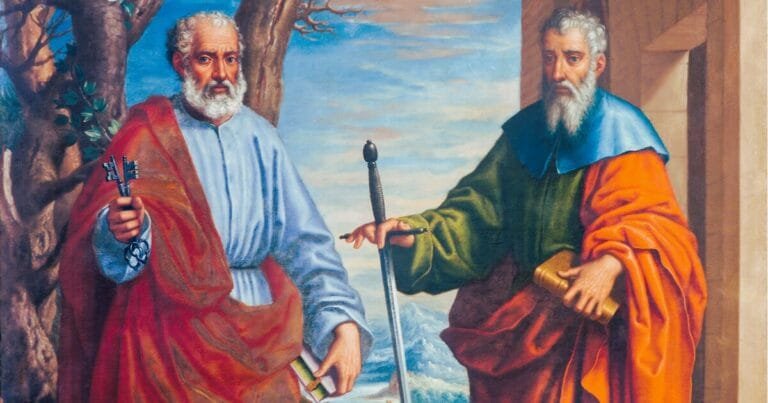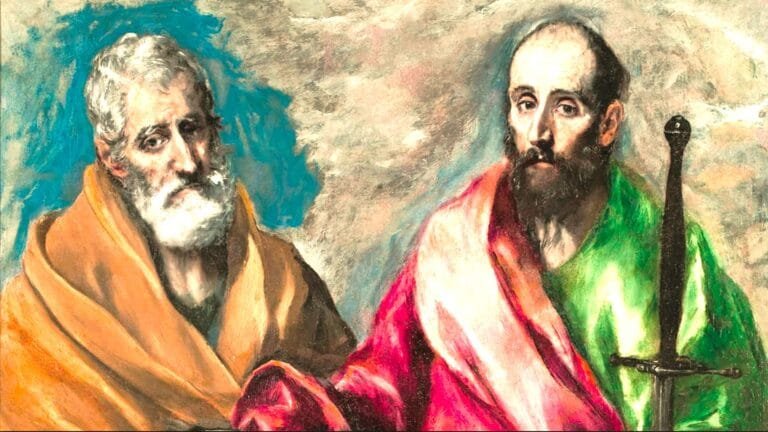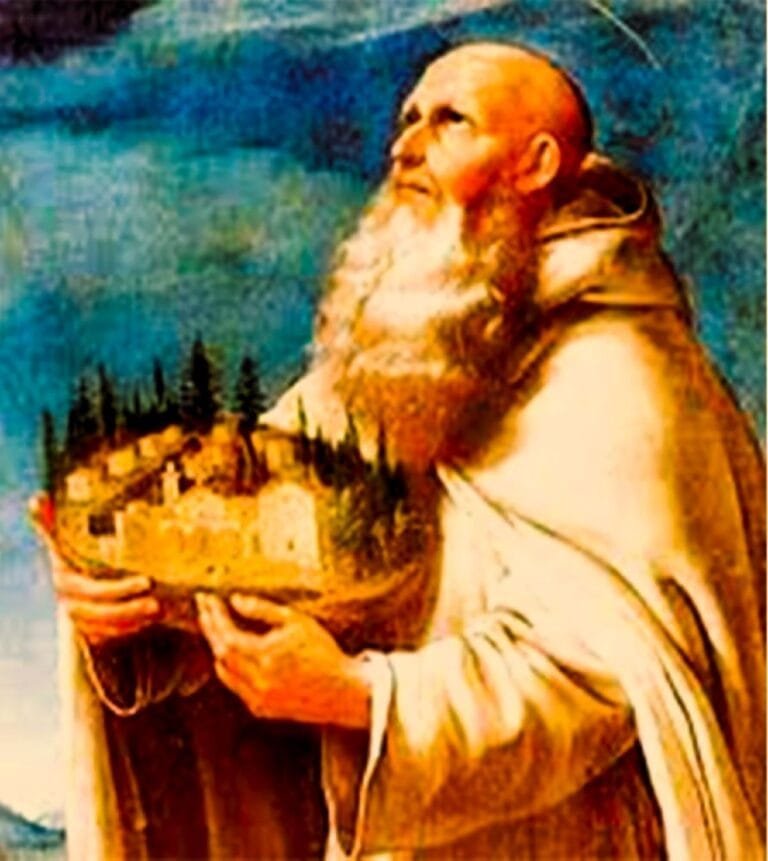POPE FRANCIS ON SAINTS PETER AND PAUL.
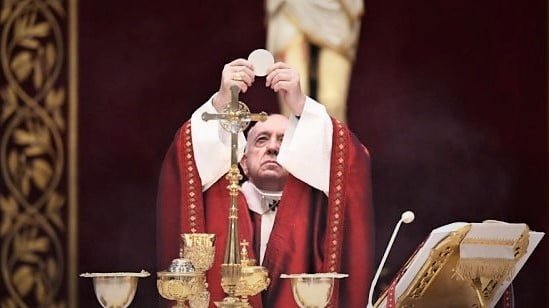
HOLY MASS AND BLESSING OF THE SACRED PALLIUM
FOR THE NEW METROPOLITAN ARCHBISHOPS
ON THE SOLEMNITY OF SAINTS PETER AND PAUL, APOSTLES
HOMILY OF HIS HOLINESS POPE FRANCIS
Saint Peter’s Basilica
Monday, 29 June 2020
On the feast of the two Apostles of this City, I would like to share with you two key words: unity and prophecy.
Unity. We celebrate together two very different individuals: Peter, a fisherman who spent his days amid boats and nets, and Paul, a learned Pharisee who taught in synagogues. When they went forth on mission, Peter spoke to Jews, and Paul to pagans. And when their paths crossed, they could argue heatedly, as Paul is unashamed to admit in one of his letters (cf. Gal 2:11). In short, they were two very different people, yet they saw one another as brothers, as happens in close-knit families where there may be frequent arguments but unfailing love. Yet the closeness that joined Peter and Paul did not come from natural inclinations, but from the Lord. He did not command us to like one another, but to love one another. He is the one who unites us, without making us all alike. He unites us in our differences.
Today’s first reading brings us to the source of this unity. It relates how the newly born Church was experiencing a moment of crisis: Herod was furious, a violent persecution had broken out, and the Apostle James had been killed. And now Peter had been arrested. The community seemed headless, everyone fearing for his life. Yet at that tragic moment no one ran away, no one thought about saving his own skin, no one abandoned the others, but all joined in prayer. From prayer they drew strength, from prayer came a unity more powerful than any threat. The text says that, “while Peter was kept in prison, the Church prayed fervently to God for him” (Acts 12:5). Unity is the fruit of prayer, for prayer allows the Holy Spirit to intervene, opening our hearts to hope, shortening distances and holding us together at times of difficulty.
Let us notice something else: at that dramatic moment, no one complained about Herod’s evil and his persecution. No one abused Herod – and we are so accustomed to abuse those who are in charge. It is pointless, even tedious, for Christians to waste their time complaining about the world, about society, about everything that is not right. Complaints change nothing. Let us remember that complaining is the second door that closes us off from the Holy Spirit, as I said on Pentecost Sunday. The first is narcissism, the second discouragement, the third pessimism. Narcissism makes you look at yourself constantly in a mirror; discouragement leads to complaining and pessimism to thinking everything is dark and bleak. These three attitudes close the door to the Holy Spirit. Those Christians did not cast blame; rather, they prayed. In that community, no one said: “If Peter had been more careful, we would not be in this situation”. No one. Humanly speaking, there were reasons to criticize Peter, but no one criticized him. They did not complain about Peter; they prayed for him. They did not talk about Peter behind his back; they talked to God. We today can ask: “Are we protecting our unity, our unity in the Church, with prayer? Are we praying for one another?” What would happen if we prayed more and complained less, if we had a more tranquill tongue? The same thing that happened to Peter in prison: now as then, so many closed doors would be opened, so many chains that bind would be broken. We would be amazed, like the maid who saw Peter at the gate and did not open it, but ran inside, astonished by the joy of seeing Peter (cf. Acts 12:10-17). Let us ask for the grace to be able to pray for one another. Saint Paul urged Christians to pray for everyone, especially those who govern (cf. 1 Tim 2:1-3). “But this governor is…”, and there are many adjectives. I will not mention them, because this is neither the time nor the place to mention adjectives that we hear directed against those who govern. Let God judge them; let us pray for those who govern! Let us pray: for they need prayer. This is a task that the Lord has entrusted to us. Are we carrying it out? Or do we simply talk, abuse and do nothing? God expects that when we pray we will also be mindful of those who do not think as we do, those who have slammed the door in our face, those whom we find it hard to forgive. Only prayer unlocks chains, as it did for Peter; only prayer paves the way to unity.
Today we bless the pallia to be bestowed on the Dean of the College of Cardinals and the Metropolitan Archbishops named in the last year. The pallium is a sign of the unity between the sheep and the Shepherd who, like Jesus, carries the sheep on his shoulders, so as never to be separated from it. Today too, in accordance with a fine tradition, we are united in a particular way with the Ecumenical Patriarchate of Constantinople. Peter and Andrew were brothers, and, whenever possible, we exchange fraternal visits on our respective feast days. We do so not only out of courtesy, but as a means of journeying together towards the goal that the Lord points out to us: that of full unity. We could not do so today because of the difficulty of travel due to the coronavirus, but when I went to venerate the remains of Peter, in my heart I felt my beloved brother Bartholomew. They are here, with us.
The second word is prophecy. Unity and prophecy. The Apostles were challenged by Jesus. Peter heard Jesus’ question: “Who do you say I am?” (cf. Mt 16:15). At that moment he realized that the Lord was not interested in what others thought, but in Peter’s personal decision to follow him. Paul’s life changed after a similar challenge from Jesus: “Saul, Saul, why do you persecute me?” (Acts 9:4). The Lord shook Paul to the core: more than just knocking him to the ground on the road to Damascus, he shattered Paul’s illusion of being respectably religious. As a result, the proud Saul turned into Paul, a name that means “small”. These challenges and reversals are followed by prophecies: “You are Peter, and on this rock I will build my Church” (Mt 16:18); and, for Paul: “He is a chosen instrument of mine to carry my name before the Gentiles and kings and the sons of Israel” (Acts 9:15). Prophecy is born whenever we allow ourselves to be challenged by God, not when we are concerned to keep everything quiet and under control. Prophecy is not born from my thoughts, from my closed heart. It is born if we allow ourselves to be challenged by God. When the Gospel overturns certainties, prophecy arises. Only someone who is open to God’s surprises can become a prophet. And there they are: Peter and Paul, prophets who look to the future. Peter is the first to proclaim that Jesus is “the Christ, the Son of the living God” (Mt 16:16). Paul, who considers his impending death: “From now on there is laid up for me the crown of righteousness, which the Lord will award to me” (2 Tim 4:8).
Today we need prophecy, but real prophecy: not fast talkers who promise the impossible, but testimonies that the Gospel is possible. What is needed are not miraculous shows. It makes me sad when I hear someone say, “We want a prophetic Church”. All right. But what are you doing, so that the Church can be prophetic? We need lives that show the miracle of God’s love. Not forcefulness, but forthrightness. Not palaver, but prayer. Not speeches, but service. Do you want a prophetic Church? Then start serving and be quiet. Not theory, but testimony. We are not to become rich, but rather to love the poor. We are not to save up for ourselves, but to spend ourselves for others. To seek not the approval of this world, of being comfortable with everyone – here we say: “being comfortable with God and the devil”, being comfortable with everyone -; no, this is not prophecy. We need the joy of the world to come. Not better pastoral plans that seem to have their own self-contained efficiency, as if they were sacraments; efficient pastoral plans, no. We need pastors who offer their lives: lovers of God. That is how Peter and Paul preached Jesus, as men in love with God. At his crucifixion, Peter did not think about himself but about his Lord, and, considering himself unworthy of dying like Jesus, asked to be crucified upside down. Before his beheading, Paul thought only of offering his life; he wrote that he wanted to be “poured out like a libation” (2 Tim 4:6). That was prophecy. Not words. That was prophecy, the prophecy that changed history.
Dear brothers and sisters, Jesus prophesied to Peter: “You are Peter and on this rock I will build my Church”. There is a similar prophecy for us too. It is found in the last book of the Bible, where Jesus promises his faithful witnesses “a white stone, on which a new name is written” (Rev 2:17). Just as the Lord turned Simon into Peter, so he is calling each one of us, in order to make us living stones with which to build a renewed Church and a renewed humanity. There are always those who destroy unity and stifle prophecy, yet the Lord believes in us and he asks you: “Do you want to be a builder of unity? Do you want to be a prophet of my heaven on earth?” Brothers and sisters, let us be challenged by Jesus, and find the courage to say to him: “Yes, I do!”
© Copyright – Libreria Editrice Vaticana
SOURCE: http://w2.vatican.va/content/francesco/en/homilies/2020/documents/papa-francesco_20200629_omelia-pallio.html
EMPHASIS MINE.
Homily of June 29, 2019
“Witnesses to life, witnesses to forgiveness and witnesses to Jesus.”
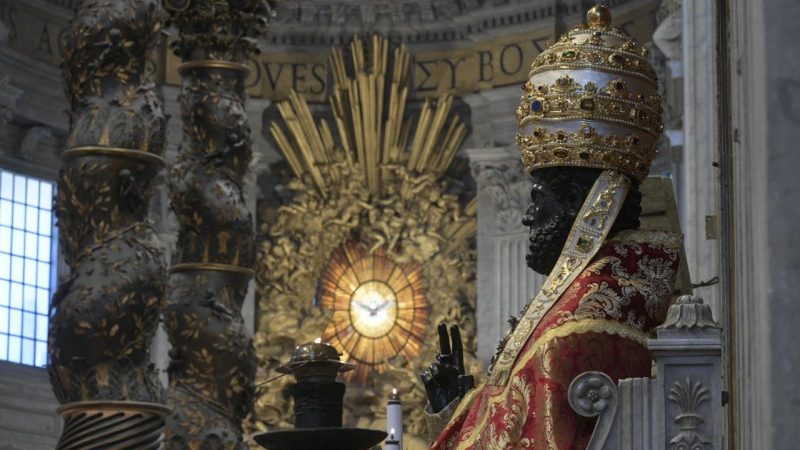
Saint Peter’s Basilica
Saturday, 29 June 2019
There is a great teaching here: the starting point of the Christian life is not our worthiness; in fact, the Lord was able to accomplish little with those who thought they were good and decent. Whenever we consider ourselves smarter or better than others, that is the beginning of the end. The Lord does not work miracles with those who consider themselves righteous, but with those who know themselves needy. He is not attracted by our goodness; that is not why he loves us. He loves us just as we are; he is looking for people who are not self-sufficient, but ready to open their hearts to him. People who, like Peter and Paul, are transparent before God. Peter immediately told Jesus: “I am a sinful man” (Lk 5:8). Paul wrote that he was “least of the apostles, unfit to be called an apostle” (1 Cor 15:9). Throughout life, they preserved this humility, to the very end. Peter died crucified upside down, since he did not consider himself worthy to imitate his Lord. Paul was always fond of his name, which means “little”, and left behind his birth name, Saul, the name of the first king of his people. Both understood that holiness does not consist in exalting but rather in humbling oneself. Holiness is not a contest, but a question of entrusting our own poverty each day to the Lord, who does great things for those who are lowly. What was the secret that made them persevere amid weakness? It was the Lord’s forgiveness.
Brothers and sisters, in the presence of these witnesses, let us ask: “Do I renew daily my own encounter with Jesus?” We may be curious about Jesus, or interested in Church matters or religious news. We may open computer sites and the papers, and talk about holy things. But this is to remain at the level of what are people saying? Jesus does not care about polls, past history or statistics. He is not looking for religion editors, much less “front page” or “statistical” Christians. He is looking for witnesses who say to him each day: “Lord, you are my life”.
Having met Jesus and experienced his forgiveness, the Apostles bore witness to him by living a new life: they no longer held back, but gave themselves over completely. They were no longer content with half-measures, but embraced the only measure possible for those who follow Jesus: that of boundless love. They were “poured out as a libation” (cf. 2 Tim 4:6). Let us ask for the grace not to be lukewarm Christians living by half measures, allowing our love to grow cold. Let us rediscover who we truly are through a daily relationship with Jesus and through the power of his forgiveness. Just as he asked Peter, Jesus is now asking us: “Who do you say that I am?”, “Do you love me?” Let us allow these words to penetrate our hearts and inspire us not to remain content with a minimum, but to aim for the heights, so that we too can become living witnesses to Jesus.
Today we bless the pallia for the Metropolitan Archbishops named in the past year. The pallium recalls the sheep that the shepherd is called to bear on his shoulders. It is a sign that the shepherds do not live for themselves but for the sheep. It is a sign that, in order to possess life, we have to lose it, give it away. Today our joy is shared, in accordance with a fine tradition, by a Delegation from the Ecumenical Patriarchate, whose members I greet with affection. Your presence, dear brothers, reminds us that we can spare no effort also in the journey towards full unity among believers, in communion at every level. For together, reconciled to God and having forgiven one another, we are called to bear witness to Jesus by our lives.
Pope’s homily during the Mass of the Feast of Saints Peter and Paul, June 29, 2018, which was celebrated in St Peter’s Square.
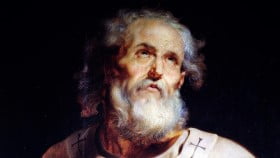
The readings we have just heard link us to the apostolic Tradition. That Tradition “is not the transmission of things or words, an assortment of lifeless objects; it is the living stream that links us to the origins, the living stream in which those origins are ever present” (BENEDICT XVI, Catechesis, 26 April 2006) and offer us the keys to the Kingdom of heaven (cf. Mt 16:19). A Tradition ancient yet ever new, that gives us life and renews the joy of the Gospel. It enables us to confess with our lips and our heart: “ ‘Jesus Christ is Lord’, to the glory of God the Father” (Phil 2:11).
The entire Gospel is an answer to the question present in the hearts of the People of Israel and today too dwells in the hearts of all those who thirst for life: “Are you he who is to come, or shall we look for another?” (Mt 11:3). Jesus takes up that question and asks it of his disciples: “But who do you say that I am?” (Mt 16:15).
Peter speaks up and calls Jesus by the greatest title he could possibly bestow: “You are the Christ” (cf. Mt 16:16), the Anointed, the Holy One of God. It is good to think that the Father inspired this answer because Peter had seen how Jesus “anointed” his people. Jesus, the Anointed One, walked from village to village with the sole aim of saving and helping those considered lost. He “anointed” the dead (cf. Mk 5:41-42; Lk 7:14-15), the sick (cf. Mk 6:13; Jas 5:14), the wounded (cf. Lk 10:34) and the repentant (cf. Mt 6:17). He anointed with hope (cf. Lk 7:38.46; 10:34; Jn 11:2; 12:3). By that anointing, every sinner – the downcast, the infirm, pagans, wherever they found themselves – could feel a beloved part of God’s family. By his actions, Jesus said in a very personal way: “You are mine”. Like Peter, we too can confess with our lips and our heart not only what we have heard, but also concretely experienced in our lives. We too have been brought back to life, healed, renewed and filled with hope by the anointing of the Holy One. Thanks to that anointing, every yoke of slavery has been shattered (cf. Is 10:27). How can we ever lose the joyful memory that we were ransomed and led to proclaim: “You are the Christ, the Son of the living God” (cf. Mt 16:16).
It is interesting to see what follows this passage in the Gospel where Peter confesses his faith: “From that time Jesus began to show his disciples that he must go to Jerusalem and suffer many things from the elders and chief priests and scribes, and be killed, and on the third day be raised” (Mt 16:21). God’s Anointed kept bringing the Father’s love and mercy to the very end. This merciful love demands that we too go forth to every corner of life, to reach out to everyone, even though this may cost us our “good name”, our comforts, our status… even martyrdom.
Peter reacts to this completely unexpected announcement by saying: “God forbid it, Lord! This must never happen to you” (Mt 16:22). In this way, he immediately becomes a stumbling stone in the Messiah’s path. Thinking that he is defending God’s rights, Peter, without realizing it, becomes the Lord’s enemy; Jesus calls him “Satan”. To contemplate Peter’s life and his confession of faith also means learning to recognize the temptations that will accompany the life of every disciple. Like Peter, we as a Church will always be tempted to hear those “whisperings” of the evil One, which will become a stumbling stone for the mission. I speak of “whispering” because the devil seduces from hiding, lest his intentions be recognized. “He behaves like a hypocrite, wishing to stay hidden and not be discovered” (SAINT IGNATIUS OF LOYOLA, Spiritual Exercises, n. 326).
To share in Christ’s anointing, on the other hand, means to share in his glory, which is his cross: Father, glorify your Son… “Father, glorify your name” (Jn 12:28). In Jesus, glory and the cross go together; they are inseparable. Once we turn our back on the cross, even though we may attain the heights of glory, we will be fooling ourselves, since it will not be God’s glory, but the snare of the enemy.
Often we feel the temptation to be Christians by keeping a prudent distance from the Lord’s wounds. Jesus touches human misery and he asks us to join him in touching the suffering flesh of others. To proclaim our faith with our lips and our heart demands that we – like Peter – learn to recognize the “whisperings” of the evil one. It demands learning to discern and recognize those personal and communitarian “pretexts” that keep us far from real human dramas, that preserve us from contact with other people’s concrete existence and, in the end, from knowing the revolutionary power of God’s tender love (cf. Evangelii Gaudium, 270).
By not separating his glory from the cross, Jesus wants to liberate his disciples, his Church, from empty forms of triumphalism: forms empty of love, service, compassion, empty of people. He wants to set his Church free from grand illusions that fail to sink their roots in the life of God’s faithful people or, still worse, believe that service to the Lord means turning aside from the dusty roads of history. To contemplate and follow Christ requires that we open our hearts to the Father and to all those with whom he has wished to identify (cf. SAINT JOHN PAUL II, Novo Millennio Ineunte, 49), in the sure knowledge that he will never abandon his people.
Dear brothers and sisters, millions of people continue to ask the question: “Are you he who is to come, or shall we look for another?” (Mt 11:3). Let us confess with our lips and heart that Jesus Christ is Lord (cf Phil 2:11). This is the cantus firmus that we are called daily to intone. With the simplicity, the certainty and the joy of knowing that “the Church shines not with her own light, but with the light of Christ. Her light is drawn from the Sun of Justice, so that she can exclaim: ‘It is no longer I who live, but Christ who lives in me’ (Gal 2:20)” (SAINT AMBROSE, Hexaemeron, IV, 8, 32).
[Original text: Italian] [Vatican-provided translation]
© Copyright – Libreria Editrice Vaticana
Stay updated: subscribe by email for free TO OUR NEW WEBSITE www.catholicsstrivingforholiness.org (PUT YOUR EMAIL IN THE SUBSCRIBE WIDGET).
We are also in www.fb.com/Catholicsstrivingforholiness. Kindly help more people in their Christian life by liking our page and inviting your family, friends and relatives to do so as well. Thanks in advance and God bless you and your loved ones! Fr. Rolly Arjonillo
